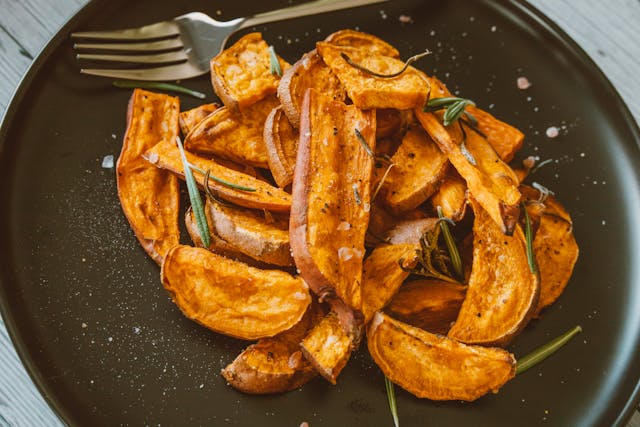Do Sweet Potatoes Have Lectins?

Want to know whether sweet potatoes are high or low in lectins? Sweet potatoes showed no lectin activity in research.
| sweet potatoes | no lectins |
| potatoes | contains lectins |
While regular potatoes are frequently considered to contain lectins, it’s worth noting that sweet potatoes are not nightshades like potatoes are.
Are Sweet Potatoes High In Lectins?
No, sweet potatoes are not high in lectins and here at Lectin Foods Base we consider sweet potatoes safe to eat on a lectin-free diet.
Sweet potatoes are not the same as potatoes. Potatoes are considered high in lectins and are part of the nightshade family.
What Types Of Sweet Potatoes Are Safe To Eat On A Lectin-Free Diet?
There are many types of sweet potatoes including purple, garnet, and the one we all know and love – the common deep orange colored variety.
In our experience and knowledge, all of these varieties are safe to eat on a lectin-free diet.
There are tons of foods that pair well with sweet potatoes, and they are a fantastic carb addition.
Lectins In Sweet Potatoes Compared To In Potatoes
While sweet potatoes and potatoes are both root vegetables, potatoes are nightshades and sweet potatoes are not.
Potatoes are a nightshade in the Solanaceae family. Other nightshades include peppers, tomatoes, and eggplant. Sweet potatoes, however, are in the Convolvulaceae family.
Is it a yam or a sweet potato? Yams are commonly called sweet potatoes and vice versa, however, are a different species as well. They typically are very similar in appearance and yams are also often a deep orange color. They taste very similar as well, and are also considered safe to eat on a lectin-free diet.

The short and sweet of it is that potatoes are not considered a low lectin food whereas sweet potatoes are considered low in lectins and are safe to eat on a lectin-free diet.
Benefits Of Eating Sweet Potatoes On A Lectin Avoidance Diet
There are so many different benefits that different healthy foods can have on our bodies, and sweet potatoes are no different, but we’ll list a few of the benefits here.
First of all, they’re a great source of Vitamin A.
Since Vitamin A requires conversion processes within the body to become usable Vitamin A, adding a healthy fat source to your meal with fat-soluble vitamins like Vitamin A can help increase absorption and assimilation.

This is one reason that some people choose to add fats to their sweet potatoes like grass-fed butter or coconut oil. It’s been said that around 3-4 grams of fat can be used to one cup of sweet potatoes for better Vitamin A absorption.
A Great Grain Alternative? Sweet potatoes are often used as a healthy alternative to bread or other carbs that is also quite low in calories. They’re also a great starchy food which there are not many of when it comes to lectin-free foods.
Sweet potatoes also contain manganese, Vitamin B, healthy minerals, and anti-oxidants. Furthermore, they contain large amounts of potassium that rival even bananas. It’s estimated that one cup of sweet potatoes has twice as much potassium as a single medium-sized banana.
Another benefit of sweet potatoes can be seen in a study that showed that purple sweet potatoes contain something called anthocyanins which induced Nrf2-mediated antioxidant enzymes. This was shown to help protect the liver and reduce inflammation by inhibiting nuclear factor kappa B.

Resources:
https://www.ncbi.nlm.nih.gov/pubmed/15914919
http://medicinalplants-kr.org/
